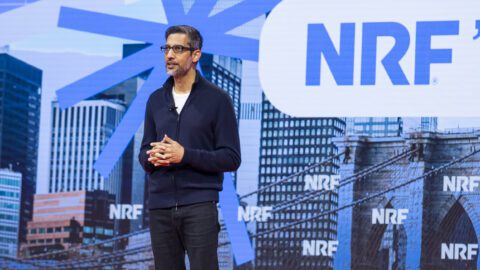There has never been a generation quite like Gen Z, and retailers need to recruit them now to bring their valuable insights and skillsets into their corporate culture. Hana Ben-Shabat, Founder of Gen Z Planet and author of the book Gen Z 360: Preparing for the Inevitable Change in Culture, Work, and Commerce, noted that while companies have a lot of preconceived notions about this cohort, they often miss the bigger picture.
“This is a generation that grew up in the 2008 recession, and they’re now experiencing the economic effects of COVID-19,” said Ben-Shabat in an interview with Retail TouchPoints. “They really developed a reputation as a generation that is focused on securing their financial future and that’s all about money, money, money. I think it’s important to emphasize that it’s not only about money. In fact, their expectation for the workforce is going to challenge employers, because it’s very all-encompassing.”
Ben-Shabat also offered advice for retailers looking to attract Gen Z workers, understand their needs and meet their most important expectations, including:
- Although Gen Z’s demands may appear contradictory, such as loving technology but wanting the human touch, they make sense when viewed through the lens of the generation’s history and culture;
- How brands can present themselves authentically to put forth an attractive value proposition, shake off retail’s reputation as a dead-end career and avoid setting off Gen Z’s “B.S meters”; and
- Why management, from onboarding to coaching, is different for Gen Z compared to other generations, and how retailers can help Gen Zers reach their full potential by answering the “why.”
Retail TouchPoints (RTP): You mention that Gen Z brings “a set of expectations and seemingly contradictory characteristics to the workplace.” What about this generation seems contradictory, and how can retailers go about navigating this challenge to recruit this new generation of workers?
Hana Ben-Shabat: People often get confused about Gen Z employees because they have a few characteristics that, on the surface, seem to be contradictory — but in reality, once you get to know them, they make complete sense.
For example, because this generation grew up in a digital era and is reliant on technology in every aspect of their lives, there is a tendency to think that they want everything to be technology-driven or that they want to do everything through a device — which is not true. While they love technology, at the same time they crave human connection. They don’t want to interact with their managers through text messages or emails. They want to sit down with their managers — these days it could be via a Zoom call — and have a face-to-face conversation. They want to have detailed guidance about what is expected from them, and they want frequent feedback. They understand that to succeed in the workplace they need support, and 68% say that access to mentors is very important when considering an employer. As such, you can argue that Gen Z is both high-tech and high-touch.
Another “contradiction” is their idealism and sense of pragmatism. Gen Z wants to work for companies that do good in the world, but no one should conflate their idealistic nature with being naive. To the contrary, this is a very realistic and shrewd generation, and they come to the workplace with a very clear set of expectations that retailers and other companies will have to meet.
In a similar vein, they are independent and dependent. This is a generation that wants to feel empowered. They want to execute work independently and they appreciate the opportunity to show what they can deliver. It’s almost the opposite of the millennials’ “office kumbaya” we all got used to. Gen Zers are telling us “Tell me what I have to do, and I’ll do it.” Yet that doesn’t mean that they don’t value being part of a team — the opposite is true. They want to feel that they belong to something, and being part of a workplace that provides a sense of a community is crucially important to them.
You could say, “How can somebody say they want to be left alone to do their work, but on the other hand they want to be part of a community?” That indeed seems contradictory, but when you understand how important individuality is to Gen Z, and how competitive they are, you can explain the independence aspect. And once you understand the sense of loneliness and isolation that they feel sometimes, you can explain their desire for community. It’s all about understanding the drivers and motivations behind the observed behaviors.
For retailers to recruit this generation it is extremely important to understand these characteristics and how they get translated into specific workplace requirements, and [then] work that into a clear Gen Z strategy that can be implemented either in a headquarters or in stores.
RTP: Gen Z has shown that it cares about how brands present themselves to the public. How should retailers go about positioning their brand across digital touch points in a consistent manner without overselling themselves, which can set off Gen Z’s B.S. detectors?
Ben-Shabat: I’ll start by saying that every company has two brands; one that they display to their customers or consumers, and one that’s their employer brand — who they are and what they stand for as an employer.
Employer branding has never been so crucial as it is right now, and while it may sound obvious, research shows that there is major room for improvement in the way companies communicate their brand to potential recruits. Gen Zers want to know why they should join you. Your ability to clearly communicate the unique value proposition of your company and your industry can make or break their interest.
The retail industry has an even bigger job to do due to its reputation of low pay and dead-end careers. In the past few months, we have seen a whole new trend on TikTok, a Gen Z playground, of young people quitting their jobs. The hashtag #quitmyjob had 160 million views by the end of September 2021, up 25% in one month. It’s not surprising. For a generation that made “side hustles” a profitable reality, some of them feel that they would rather pursue their own adventure than work in a job that has little fulfillment or future.
So to attract Gen Zers, retailers will have to take a closer look at their value proposition and rethink elements like pay, career path and other aspects that currently get in the way of them being attractive to this upcoming generation.
In addition, communicating the value proposition authentically is critical. Overselling who you are can backfire. If you have poor Glassdoor reviews and you are raving about how great a culture you have, it’s not going to take long for a Gen Z candidate to find out the truth. Be factual and truthful while highlighting the bright spots. Gen Z has a well-developed B.S. meter, and they can easily spot inauthenticity. Being authentic could save you all the selling. Being inauthentic may cost you more than just money.
RTP: It sounds like you’re saying that the recruitment and onboarding processes need to focus on the context, or the “why,” of what Gen Z employees will be doing. What about the modern workplace makes this approach so important, and how can retailers adjust to meet this need?
Ben-Shabat: The first thing I would say is that the traditional onboarding days of “meet-and-greet, discuss the mission and vision of the company and get a gift bag” are over. Onboarding today requires so much more.
The modern workplace is more complex than it used to be. Companies are going through transformations, and business units, departments, teams and key processes are much more connected and much more multidisciplinary. This means that even if someone is doing a job in one department, they will have to connect with many other parts of the organization to get their job done. [Yet] they are not going to be able to tell other people what to do, because it is not in the remit of their decision-making rights.
So newcomers will need to be able to influence, to communicate well and to be able to get things done in a team, and that requires not only technical knowledge but also softer skills. From influencing and negotiating through to problem-solving, newcomers will have to navigate a more complex and networked organization. It’s impossible to think that anyone can complete a task in a silo these days. To navigate this complexity successfully, be it in a big store or a head office, newcomers will need to know the context and the organizational interdependencies, and they will need support to navigate those. Companies should start giving this support during onboarding, which is no longer a “one-day thing” but a process.
One great way to onboard newcomers these days is to do rotations. Rotations are by no means a new concept; there were always companies that offered this type of program, but now they have a very different value. [When] you move people across your organization so they actually learn the different functions, they also learn how everything is connected. Understanding those complexities, and understanding how people work in different ways and in different styles, is really helpful in developing the next generation of talent and leaders.
The other thing which I think is very important during onboarding and beyond is to address Gen Z’s need to know the “why.” This is a generation that has a tendency to question everything — it’s just part of who they are. So they want to know, “Why we are doing things the way we are doing them? Why can’t we do it in a different way?” They’re not willing to accept answers like, “Because this is how we we’ve been doing it for the past 50 years.” It’s just not going to fly with them.
I think this is going to be very challenging for retailers, especially at the store level, because retail stores are run by very rigid policies and procedures. You open at a specific time. You follow procedures in a certain order or way, you display things based on a given planogram, and so on.
I think managers should take the time to explain “the why” to Gen Z while also being open to their suggestions. Sometimes the best way to respond to a young, ambitious, and motivated person who is asking a challenging question is by asking back, “How would you do that ?” What if their fresh perspective is indeed better? Why not let them contribute? I think not blocking that enthusiasm is going to be critical to earning their trust, loyalty and engagement.
RTP: A lot has been said about all the ways Gen Z is different from previous generations, but they also share many similarities with their older compatriots. What are some of the tried-and-true elements of attracting and retaining great employees that are still relevant when working with Gen Z?
Ben-Shabat: Everyone wants to work for a company where they can be their best selves; where there is a sense of purpose to what they do; where they feel that what they deliver has an impact, big or small, on the company or its customers; and where they feel valued by their manager. I believe that whether you are a Baby Boomer or Gen Z, this is going to be true. And building on commonalities is going to be the basis of integrating and creating a fair and harmonious multi-generational workforce in retail as well as in other industries.













